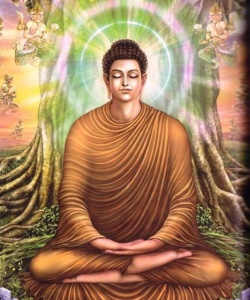Difference between revisions of "Four meditations"
(Created page with "thumb|250px| <poem> four meditations [四念処・四念住] (Jpn shi-nenjo or shi-nenju ) Also, four states of mindfulness. Four types of meditatio...") |
|||
| (2 intermediate revisions by 2 users not shown) | |||
| Line 1: | Line 1: | ||
[[File:Lord-Bu.jpg|thumb|250px|]] | [[File:Lord-Bu.jpg|thumb|250px|]] | ||
<poem> | <poem> | ||
| − | four meditations | + | [[four meditations]] |
| − | [ | + | [[四念処]]・[[四念住]] (Jpn [[shi-nenjo]] or [[shi-nenju]] ) |
| − | Also, four states of mindfulness. Four types of meditation on the body, sensation, mind, and phenomena. | + | Also, four states of [[mindfulness]]. [[Four types of meditation]] on the [[body]], [[sensation]], [[mind]], and [[phenomena]]. |
| − | (1) Meditation on the body means to perceive the body as impure, | + | (1) [[Meditation on the body]] means to {{Wiki|perceive}} the [[body]] as impure, |
| − | (2) meditation on sensation is to perceive all sensation as suffering, | + | (2) [[meditation on sensation]] is to {{Wiki|perceive}} all [[sensation]] as [[suffering]], |
| − | (3) meditation on the mind is to perceive the mind as impermanent, and | + | (3) [[meditation on the mind]] is to {{Wiki|perceive}} the [[mind]] as [[impermanent]], and |
| − | (4) meditation on phenomena is to perceive that they are without a "self," that is, without any intrinsic nature of their own. | + | (4) [[meditation on phenomena]] is to {{Wiki|perceive}} that they are without a "[[self]]," that is, without any [[intrinsic nature]] of their [[own]]. |
| − | The concept of the four meditations negates the ideas of purity (seeing the body as pure), pleasure (seeing all sensation as pleasure), permanence (seeing the mind as permanent), and ego (seeing phenomena as possessing a self) that were prevalent in India before the appearance of Buddhism. The four meditations are divided into specific meditation and general meditation. Specific meditation means to meditate on each of the four objects of meditation individually. General meditation means to meditate on them as a whole. The four meditations refer to the first of the seven constituent categories of the thirty-seven aids to the way, or the thirty-seven practices leading to enlightenment. | + | The {{Wiki|concept}} of the [[four meditations]] negates the [[ideas]] of [[purity]] ([[seeing]] the [[body]] as [[pure]]), [[pleasure]] ([[seeing]] all [[sensation]] as [[pleasure]]), [[permanence]] ([[seeing]] the [[mind]] as [[permanent]]), and [[ego]] ([[seeing]] [[phenomena]] as possessing a [[self]]) that were prevalent in [[India]] before the [[appearance]] of [[Buddhism]]. |
| + | |||
| + | The [[four meditations]] are divided into specific [[meditation]] and general [[meditation]]. Specific [[meditation]] means to [[meditate]] on each of the [[four objects of meditation]] individually. | ||
| + | |||
| + | General [[meditation]] means to [[meditate]] on them as a whole. | ||
| + | |||
| + | The [[four meditations]] refer to the first of the seven constituent categories of the [[thirty-seven aids to the way]], or the [[thirty-seven practices leading to enlightenment]]. | ||
</poem> | </poem> | ||
{{R}} | {{R}} | ||
[http://www.sgilibrary.org/search_dict.php?SearchSelect=dict&p=5&m=1&in=2&q=Enlightenment www.sgilibrary.org] | [http://www.sgilibrary.org/search_dict.php?SearchSelect=dict&p=5&m=1&in=2&q=Enlightenment www.sgilibrary.org] | ||
[[Category:Buddhist Terms]] | [[Category:Buddhist Terms]] | ||
| − | [[Category:Meditation]] | + | [[Category:Meditation]]{{BuddhismbyNumber}} |
Latest revision as of 00:26, 3 October 2015
four meditations
四念処・四念住 (Jpn shi-nenjo or shi-nenju )
Also, four states of mindfulness. Four types of meditation on the body, sensation, mind, and phenomena.
(1) Meditation on the body means to perceive the body as impure,
(2) meditation on sensation is to perceive all sensation as suffering,
(3) meditation on the mind is to perceive the mind as impermanent, and
(4) meditation on phenomena is to perceive that they are without a "self," that is, without any intrinsic nature of their own.
The concept of the four meditations negates the ideas of purity (seeing the body as pure), pleasure (seeing all sensation as pleasure), permanence (seeing the mind as permanent), and ego (seeing phenomena as possessing a self) that were prevalent in India before the appearance of Buddhism.
The four meditations are divided into specific meditation and general meditation. Specific meditation means to meditate on each of the four objects of meditation individually.
General meditation means to meditate on them as a whole.
The four meditations refer to the first of the seven constituent categories of the thirty-seven aids to the way, or the thirty-seven practices leading to enlightenment.
